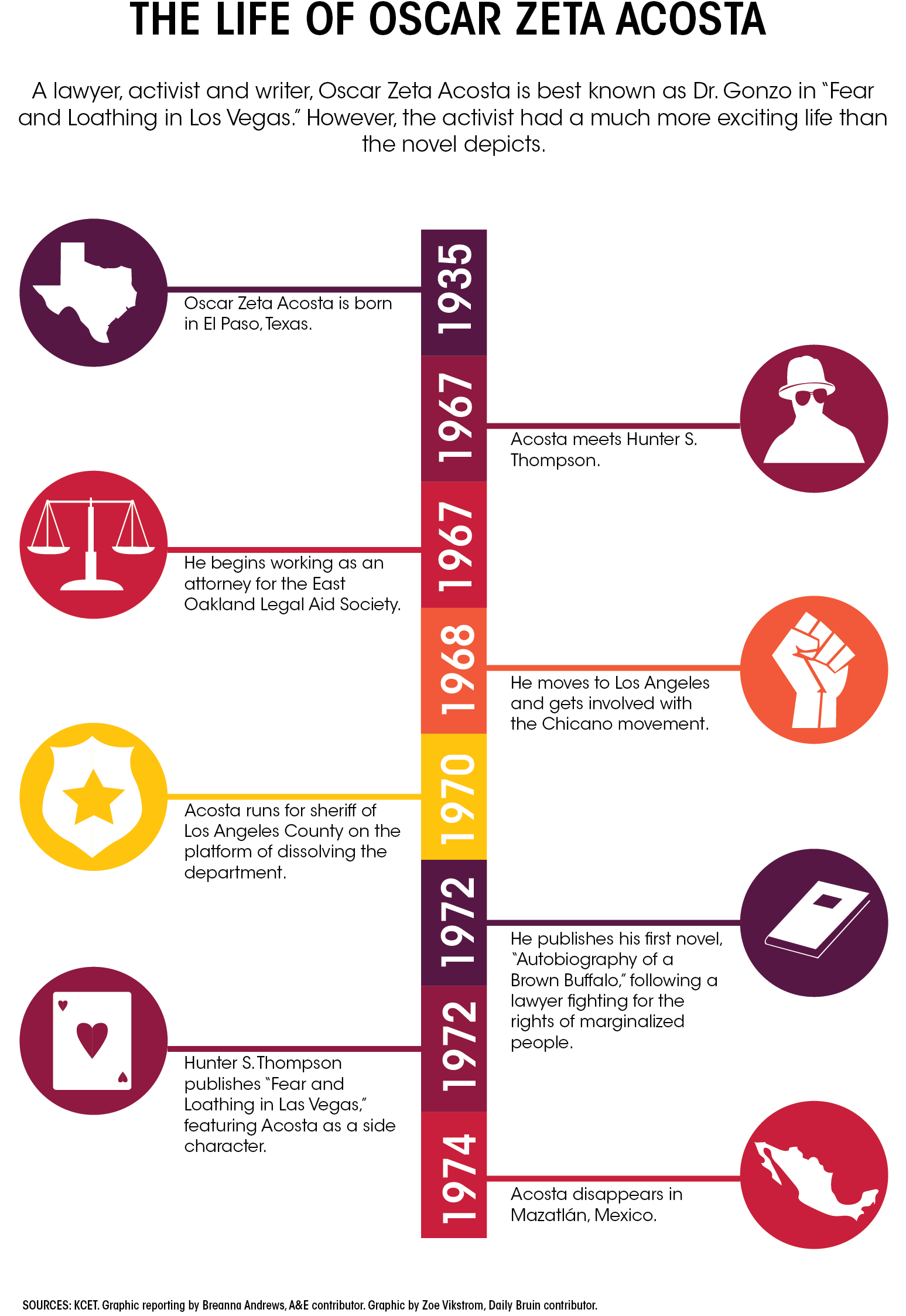Alum directs film following life and disappearance of Oscar Zeta Acosta

(Zoe Vikstrom/Daily Bruin)
"The Rise and Fall of the Brown Buffalo"
Red Nation Film Festival
Saturday
Prices vary
He went from being the son of a peach picker to being a lawyer, activist and novelist. And yet, Oscar Zeta Acosta is oftentimes known simply for the fictional character based off him, said alumnus Phillip Rodriguez.
Directed by Rodriguez, the film “The Rise and Fall of the Brown Buffalo,” follows the life of writer and lawyer Acosta from his involvement in the Chicano movement to his mysterious disappearance. Acosta was best known for being fictionalized as Dr. Gonzo, a character in Hunter S. Thompson’s roman-a-clef novel, “Fear and Loathing in Las Vegas.” But through the film, Rodriguez said he aims to elevate the prolific figure from the small character in Thompson’s novel to a revolutionary activist who fights for Chicano justice. The film will be screened at the Red Nation Film Festival on Saturday, and will show audiences an exemplary figure whose traits should be embodied today, Rodriguez said.
“I think that in a time like now where people are looking for ways to dissent … he’s a nice model because he’s imperfect, and you don’t have to be perfect to be a rebel,” Rodriguez said. “It might be helpful to be a little crazy, a little obsessive and a little obscene, and Oscar is those things.”
Acosta grew up in Riverbank, California, where the majority of the population was either white or Hispanic. Actor Jeff Harms, who played Acosta’s friend and fellow writer Thompson in the film, said Acosta saw the issue of disenfranchisement from a young age. He spent his whole life searching for ways he could be empowered, and determining where he belonged in the world, he said. Rodriguez said he wanted to show how this struggle began from his childhood and how it continued to affect him while he was an activist.
“All these indignities and limits that white supremacy places on a bright, capable, young nonwhite person – those informed Oscar’s philosophies and politics going forward,” Rodriguez said.
Harms said he believes Acosta tried to find his identity through writing and activism. The writing also allowed Acosta to distance himself from the Dr. Gonzo figure, who was a character that did not accurately represent Acosta. In the novel, Dr. Gonzo is a large Samoan man, who is not born in mainland America. Acosta’s novel was published in 1972, the same year Thompson’s was set in, but Thompson is considered an icon while Acosta just shows up on his stage, Harms said.
The film also features Acosta’s own struggles with drugs and identity, Rodriguez said. Oftentimes, revolutionaries are painted in a certain light that doesn’t allow the audience to see their flaws, but Rodriguez said he chose to reveal Acosta’s flaws rather than ignore them. Sometimes, while he was defending his clients in court, Acosta was on drugs. He also, at one point, brought a gun to the courtroom, Rodriguez said. Producer and alumna Alison Sotomayor said the film even features a clip of the real Acosta smoking marijuana. His unorthodox methods may be shocking but Rodriguez said that is what makes him fresh.
“(Acosta) insisted on sex, drugs, rock ‘n’ roll. He was looking for glory, looking for attention, looking for love and he wasn’t ashamed of that,” Rodriguez said. “He was a lot like all of us … he wanted to do the right thing but also make the most out of his life and enjoy it.”
Sotomayor said though Acosta was seen as a hero for the Chicano movement, his shortcomings also included misogyny. Though Socorro Aguiniga, the woman who would become his wife – and eventually ex-wife, introduced Acosta to revolutionaries in Los Angeles, Sotomayor said Acosta was known for referring to women disparagingly, even writing about it in one of his books. Sotomayor said she and Rodriguez chose to show this aspect of his imperfections in the film as well, even using a direct quote from Acosta referring to having sex with “two broads.”
Despite many monumental events and struggles, Acosta’s life ended on an abrupt note, Rodriguez said. The activist reportedly disappeared in 1974 in Mazatlan, Mexico. But still, there have been claims of Acosta being seen sitting in a bar, or riding a cigarette speedboat off the coast of Florida, Rodriguez said. But there is something poetic about the way Acosta’s story ends, he said; because his fate is unknown, it leaves the audience more curious about him and his feats, he said.
“With that kind of energy, with that kind of madness, with that kind of appetite for danger maybe those people aren’t designed to live all that long,” Rodriguez said. “He burned like a bright comet and shot across the sky.”

